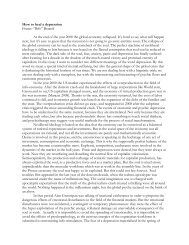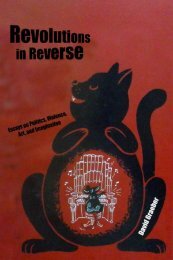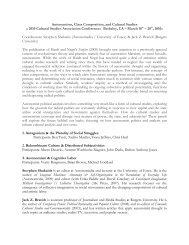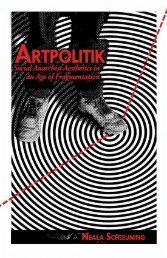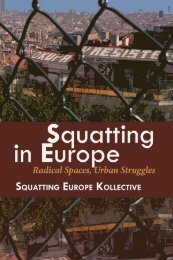nanopolitics handbook - Minor Compositions
nanopolitics handbook - Minor Compositions
nanopolitics handbook - Minor Compositions
You also want an ePaper? Increase the reach of your titles
YUMPU automatically turns print PDFs into web optimized ePapers that Google loves.
to zero. It could be Guattari or anything else: a necessary ingredient to brandyourself as a knowledge producer. You organise a cultural project with yourcolleagues, with the aspiration of changing something for the better in yourneighbourhood, and despite the relative independence that you might gainfrom the council or whatever institution providing the (little) funding, youend up packaging a cultural product, and reproducing roles and social categories:the cultural organisers, the special guests, the participants, the public...You teach at the university as a ‘postgraduate researcher with teaching duties’,with little money and an annual contract that you never know until the summerif they are going to renew. You have to struggle with an institutional pressureof delivering knowledge to the students, knowledge as nicely wrapped upand ready to swallow, in an academia that resembles more and more a shop,where customers’ satisfaction is what really counts.Academic discussions have to comply with a reasonable protocol, everythinghas to be under control, the machine for the production of knowledgehas to replicate itself. This is a machine that gets fed by the desires, aspirationsand creativity of whoever takes part in it – as long as desire, aspirations andcreativity can become useful, as long as they can be absorbed and neutralised.There’s no limit to the voraciousness of the neoliberal institution, if the nourishmentcan be digested, accounted for, justified, turned into profit.Work as competition shapes our individualised lives, often even when wecollaborate together; culture as a specialised field producing commoditiesand perpetuating hierarchies shapes subjectivity; professionalization characterisesour relations and stiffens our bodies. Life in its entirety becomesprofessionalised: you have to demonstrate that you are worth it, that you canmake it, that you are bright, that you have good contacts and a good CV comingup when someone googles your name. In order to demonstrate who youare, you are required to constantly measure yourself and your performanceagainst that of everybody else. You have to develop a hierarchical structure ofjudgement where you can negotiate your position in relation with the positionof everyone else. Our bodies contract, shrink and stiffen according to thischarts used to define individuals’ relations. This is how competition works:even if you don’t really feel it, your body does.In this context, it’s seductive to apply the same regulatory and specializinglogics to our lives and politics. On the spur of the micro-fascisms thatcome as the backlash of a ceaselessly de – and re – territorialised neoliberalsubjectivity, we easily become rigid about formal guidelines. New modes ofmeasure come to apply to us all the time, and often leave us at a loss forways of valuing and evaluating our experiences and projects: our stressedresponse may consist of reproducing the numb politics of measure. We insist35




